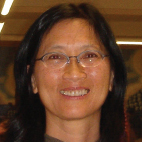 |
|
| SEARCH | COSMOS TO COPEPODS | ||||||||
|
From Cosmos to Copepods - How Does Turbulence Impact Different Scales? Presented by Dr. Jeannette Yen - January 30, 2013
Dr. Jeannette Yen takes us on an intriguing adventure, from the cosmos to copepods, in the second of a three-part webinar series on the concept of turbulence. A follow-up to Dr. Donald Webster’s presentation that focused on introducing turbulence and why it matters to us, Dr. Yen shows us how turbulence can occur at various scales and the similarities we see between islands forming vortical wakes in the atmosphere and zooplankton moving through the water column. Her talk is jam-packed with multimedia content, from incredible close-up images of copepod feeding appendages to videos of her research observing mating behavior in various copepod species. She incorporates aspects of Dr. Webster’s webinar and prepares the audience for the last and final installment of this series presented by Dr. Peter Jumars, which will focus on the ocean's tiniest organisms. Webinar Archive You can watch a video of the webinar below. Below the video is Dr. Yen's interactive concept map so that you may follow along with the presentation. Concept Map This webinar features a map created by Dr. Yen entitled, "How Do Copepods React & Interact With Turbulence at Small Scales?". You can explore this map in the window below, or save it to your own CLIMB account by clicking on the light blue wrench in the upper left corner and selecting Copy Map to My Maps. About the Presenter
Dr. Jeannette Yen Dr. Jeannette Yen received her Ph.D. in Oceanography from the University of Washington in Seattle. Her research interests include small-scale biological-chemical-physical interactions in plankton, especially the behavior and signal recognition by marine zooplankton: fluid physics of signal structure, neurophysiological basis of signal detection, consequences on feeding ecology, functional morphology, biochemical composition, and reproductive strategies - of marine plankton, especially copepods, from tropical to polar oceanic regions.Georgia Tech This webinar series was supported by the National Science Foundation grant #OCE-0724744 “CMG Collaborative Research: Interactions of Phytoplankton with Dissipative Vortices.” PI: P. Jumars, Co-PI Karp-Boss. |
|
|||||||






